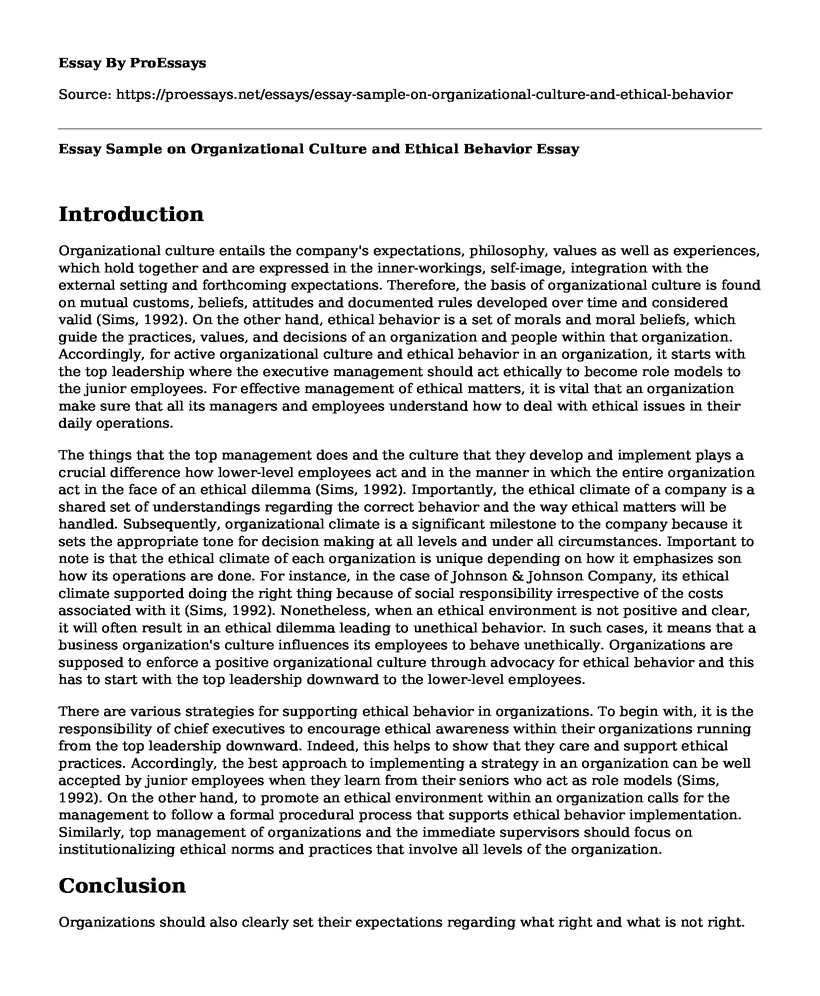Introduction
Organizational culture entails the company's expectations, philosophy, values as well as experiences, which hold together and are expressed in the inner-workings, self-image, integration with the external setting and forthcoming expectations. Therefore, the basis of organizational culture is found on mutual customs, beliefs, attitudes and documented rules developed over time and considered valid (Sims, 1992). On the other hand, ethical behavior is a set of morals and moral beliefs, which guide the practices, values, and decisions of an organization and people within that organization. Accordingly, for active organizational culture and ethical behavior in an organization, it starts with the top leadership where the executive management should act ethically to become role models to the junior employees. For effective management of ethical matters, it is vital that an organization make sure that all its managers and employees understand how to deal with ethical issues in their daily operations.
The things that the top management does and the culture that they develop and implement plays a crucial difference how lower-level employees act and in the manner in which the entire organization act in the face of an ethical dilemma (Sims, 1992). Importantly, the ethical climate of a company is a shared set of understandings regarding the correct behavior and the way ethical matters will be handled. Subsequently, organizational climate is a significant milestone to the company because it sets the appropriate tone for decision making at all levels and under all circumstances. Important to note is that the ethical climate of each organization is unique depending on how it emphasizes son how its operations are done. For instance, in the case of Johnson & Johnson Company, its ethical climate supported doing the right thing because of social responsibility irrespective of the costs associated with it (Sims, 1992). Nonetheless, when an ethical environment is not positive and clear, it will often result in an ethical dilemma leading to unethical behavior. In such cases, it means that a business organization's culture influences its employees to behave unethically. Organizations are supposed to enforce a positive organizational culture through advocacy for ethical behavior and this has to start with the top leadership downward to the lower-level employees.
There are various strategies for supporting ethical behavior in organizations. To begin with, it is the responsibility of chief executives to encourage ethical awareness within their organizations running from the top leadership downward. Indeed, this helps to show that they care and support ethical practices. Accordingly, the best approach to implementing a strategy in an organization can be well accepted by junior employees when they learn from their seniors who act as role models (Sims, 1992). On the other hand, to promote an ethical environment within an organization calls for the management to follow a formal procedural process that supports ethical behavior implementation. Similarly, top management of organizations and the immediate supervisors should focus on institutionalizing ethical norms and practices that involve all levels of the organization.
Conclusion
Organizations should also clearly set their expectations regarding what right and what is not right. This should include written and unwritten guidelines and regulations regarding how to behave within the organization settings, which entails everything starting from attitude expression, attire, behavior toward customers, colleagues and the public (Bolman, and Terrence). Lastly but not least, organizations should model desirable behaviors. Desirable behavior can be realized through leaders practicing exactly what they preach to act as a model to their junior employees. Also, it is essential to reinforce the behavior that an organization wants and not a practice it does not wish.
Works Cited
Bolman, Lee G., and Terrence E. Deal. Reframing organizations: Artistry, choice, and leadership. John Wiley & Sons, 2017.
Sims, R. (1992). The challenge of ethical behavior in organizations. Journal Of Business Ethics, 11(7), 505-513. doi: 10.1007/bf00881442
Cite this page
Essay Sample on Organizational Culture and Ethical Behavior. (2022, Dec 22). Retrieved from https://proessays.net/essays/essay-sample-on-organizational-culture-and-ethical-behavior
If you are the original author of this essay and no longer wish to have it published on the ProEssays website, please click below to request its removal:
- Exploring Kohl and Hofstede Values Based on the Apple Company Essay
- BNP Paribas, Culture Shock and Humanized Robots Reports
- Multidisciplinary vs Interprofessional Teams in Medicine Essay
- Assignment Example on Time Management
- Strategies of Superstar Firms Paper Example
- Essay Sample on Be a Leader: Motivate & Emphasize Teamwork for Success
- Essay Sample on Portfolio Analysis: Allocating Resources for Greater Profits







